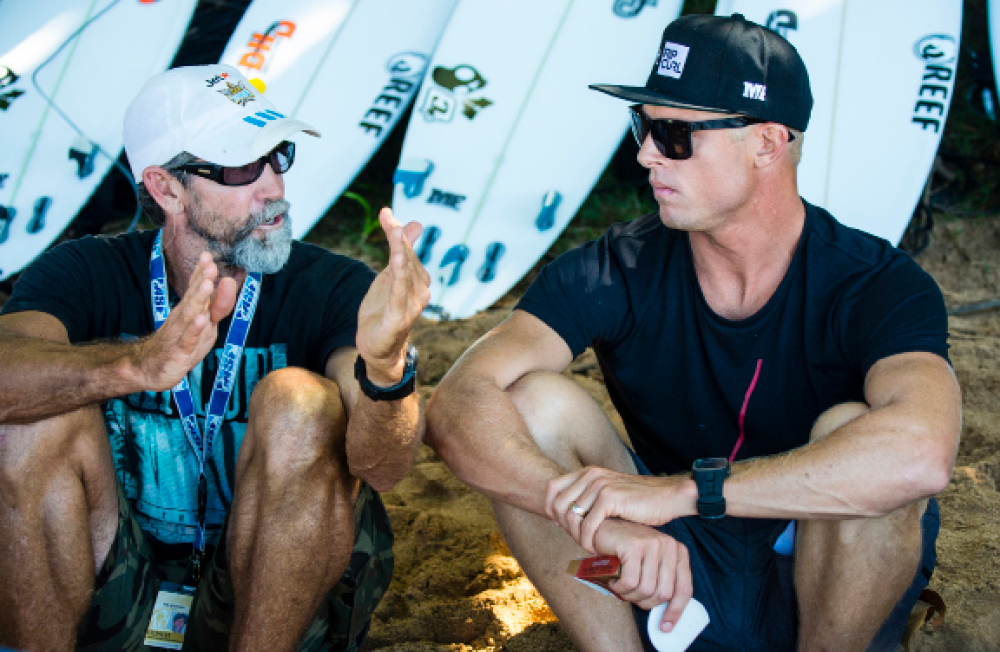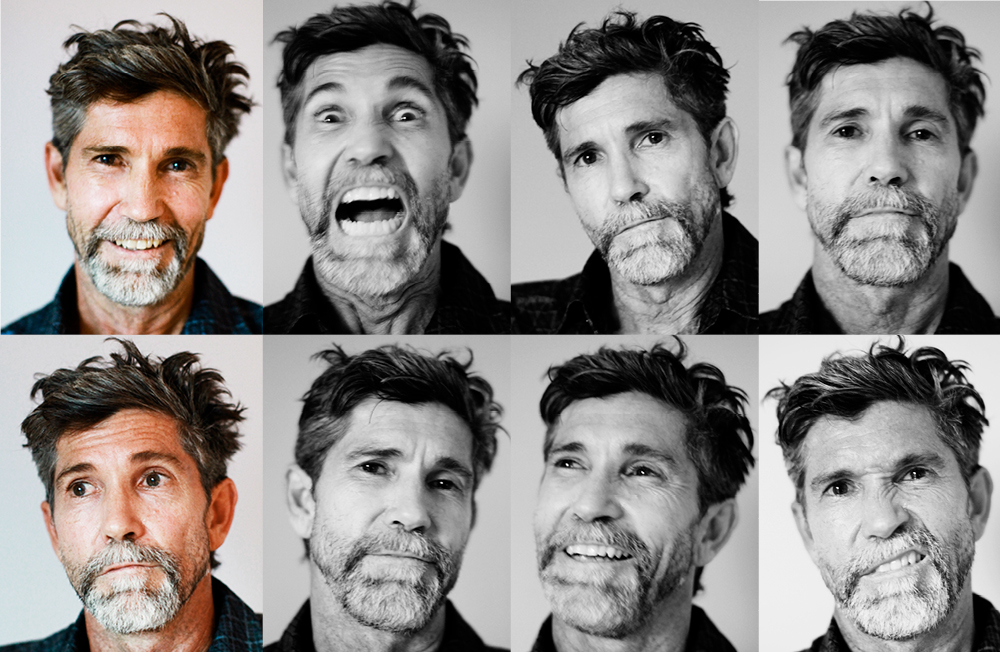The Secrets Of Surf Coaching Explained By Phil McNamara
Share
Phil McNamara is a coaching savant, a man known to sculpt masterpieces out of the rough material of talented young surfers. His clients have included James “Billy” Watson, Jay “Bottle” Thompson and Dave Rastovich, three powerful and individual stylists who also happen to be all-time standouts at Burleigh Heads. And then there’s his flagship client, triple World Champion Mick Fanning*, who took his final bow in spectacular fashion at this year’s Bells Pro (as you’re no doubt aware). Widely known for his calm authority and his modesty, we were never going to extract any claims from Phil regarding Mick’s Titles, but leaving this aside, there’s much to learn from this particular Sage.
Growing up with Surfing: I was born on the Darling Downs, but my father was involved in the surf lifesaving scene, a founding member of the Miami Club on the Gold Coast and as a family I think we spent every second weekend down there. It was only natural that I would want to surf. Especially after seeing a Burleigh barrel for the first time. Almost super-natural. Burleigh Cove and South Straddie are my favourite waves, but I tend to just go the beachie out front most mornings. In my own surfing life, when I’m not carrying an injury I still prefer a DHD 6’2” Ducks Nuts. But Mick just gave me a Mark Richards Super Twin made for me by MR himself. I just wanted to put that thing on the wall. So iconic.
Coaching: Anyone can be coached. Even the most anti-coach, anti-technique surfers have been coached somewhere along the line, because coaching is just about opening a door to learning and experiencing new things. If you’ve ever watched where the local guys jump off the rocks or noticed that the good surfers bend their knees when they turn or even looked at a surf mag and desired what you saw, then you’ve been “coached”. The pathway to learning and experiencing has been opened a bit wider by interacting with another like-minded individual. How narrow you want to go with that assisted learning relationship is a personal preference and not everyone wants to take it to the limit. One of the most satisfying things about surfing is the sense of independence and self-expression we get from it, so I totally understand the need for self-discovery. But you discover a lot more if someone points you in the right direction. There has to be a friendship between athlete and coach, to the extent that there needs to be a high level of trust in the relationship, and it’s hard to trust someone who isn’t your friend. But the key to mental preparation is to eliminate doubt. Fear and doubt will kill confidence in a moment. The opposite of doubt is knowledge, so as a coach I focus on helping the surfer eliminate unknowns. Personalities aren’t really a part of that process as long as there is a good attitude to facing your fears and doubts. You’ve got to admit to them before you can work on them. I always like to keep some distance from my clients, no matter how well a friendship develops. I need to be the one bringing new challenges and encouraging improvement. Your best friend doesn’t really do that. He just likes you as you are. So I can’t be the surfer’s best friend cause it’ll compromise the role I play as a coach.
Processing defeat: Injury, defeat and rejection are three very different types of disappointment, so they’re often dealt with independently of each other. But in general terms, a setback usually feels like a horrible betrayal to the great champions. They’re not used to it. It feels more personal to them. Especially if it’s the ocean that’s betrayed them. All the great champions are unique individuals and they process disappointment uniquely too. Kelly seems to like talking it out and then going to some place where the waves are better. Mick will often internalise it and use it to strengthen his resolve. He bounces back by working on the weakness that let him down. He’ll make detailed plans for improvement the day after a defeat. He faces up like no other man I’ve met. You can learn to lose more constructively. Usually the older guys are better at keeping a loss in perspective so I guess that suggests they’ve learnt to deal with defeat constructively. The young surfer is usually struggling with how they want to surf versus how much they want to win. That’s a real dilemma. A simple way to be more constructive is to just categorise the loss. Was it mostly the ocean not co-operating or was it mostly the surfer not executing? Then you have a starting point based on facts instead of emotions. Life shouldn’t only be approached competitively. Life is about experiencing, learning and sharing. But being competitive will definitely help drive you to be your personal best. So that’s learning about and experiencing your own limits. I think being really passionate about something in life is more healthy than being competitive. It’s possible for a good coach to work across completely different sports. If your enthusiasm for the sport is there and you have good observational and analytical skills, then a good coach is a good coach. Usually it’s the inter-personal skills that are common to all good coaches. They have empathy with their athletes and the partnership evolves as a result. So yeah, netball? Bring on the Thunderbirds!
“I constantly look at people – athletes and public figures with obvious self-defeating behaviours – and think ‘I wish I could get my hands on that person. I could turn them around’.”

Mick: I’m constantly amazed by Mick’s memory and attention to detail when dealing with people. If he’s engaging with someone, he is totally present with them and will remember their circumstances and their “essence” for years afterwards. Especially kids and people who have done it tough. He walks in their shoes for as long as he can, helps them as much as he can, and genuinely values the time he’s had with them. The other “special” gift is his decision-making ability. Under extreme pressure, with huge distractions around him, he can point a laser focus on a problem and make the right choice almost every time. I’m in awe of that. I’ve never blown up at Mick, but that’s more a reflection on his talents than mine. He has very, very rarely disappointed me and he’s never dogged a heat or a training session in his life so you can’t get frustrated with him. But in general I think that coaches yelling at their athletes is ridiculous. It’s just surfing. If there’s a problem, find a solution. If I can’t find a way to stop the mistakes from happening, then it’s time for a new coach, not time to start yelling.
Teaching and learning: Coaching is exactly like parenting, only parents have to have lesson plans for every aspect of life; coaches just need a plan that improves surfing. The process of breaking things down into manageable chunks and letting individuals learn and develop with independence is very similar for both. I constantly look at people – athletes and public figures with obvious self-defeating behaviours – and think “I wish I could get my hands on that person. I could turn them around.” I’ve even felt bad about not doing it. The waste of talent haunts me. But as I keep reminding myself, you can’t help ‘em all. In surfing it’s very rare to see the coach pushing too hard. Usually it’s the surfer who is straying outside the boundaries of good sports science cause when the surf is pumping, surfers will surf. Tired, injured, dehydrated: they’ll still do one more lap before dark and be up at dawn to do it again. The parent-coach can be a bit borderline sometimes but that’s more in the area of wanting competitive results more than the child does. The parent needs to balance the pleasure of winning with the purer pleasure of just surfing for the feeling. I’ve seen more than enough surfers rebel against their parents by giving up surfing altogether. Everyone inspires me. At least everyone has the potential to. There’s a few who’ve had their chance and failed. But I still have them on the list. A great comeback is always inspirational.
*First Published in Surfing World #347, December, 2013
